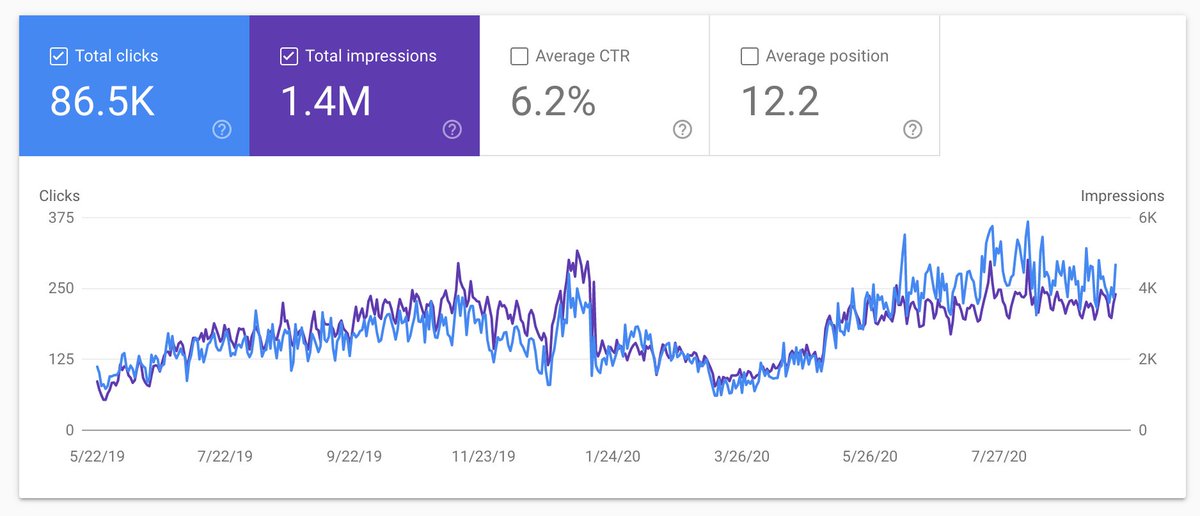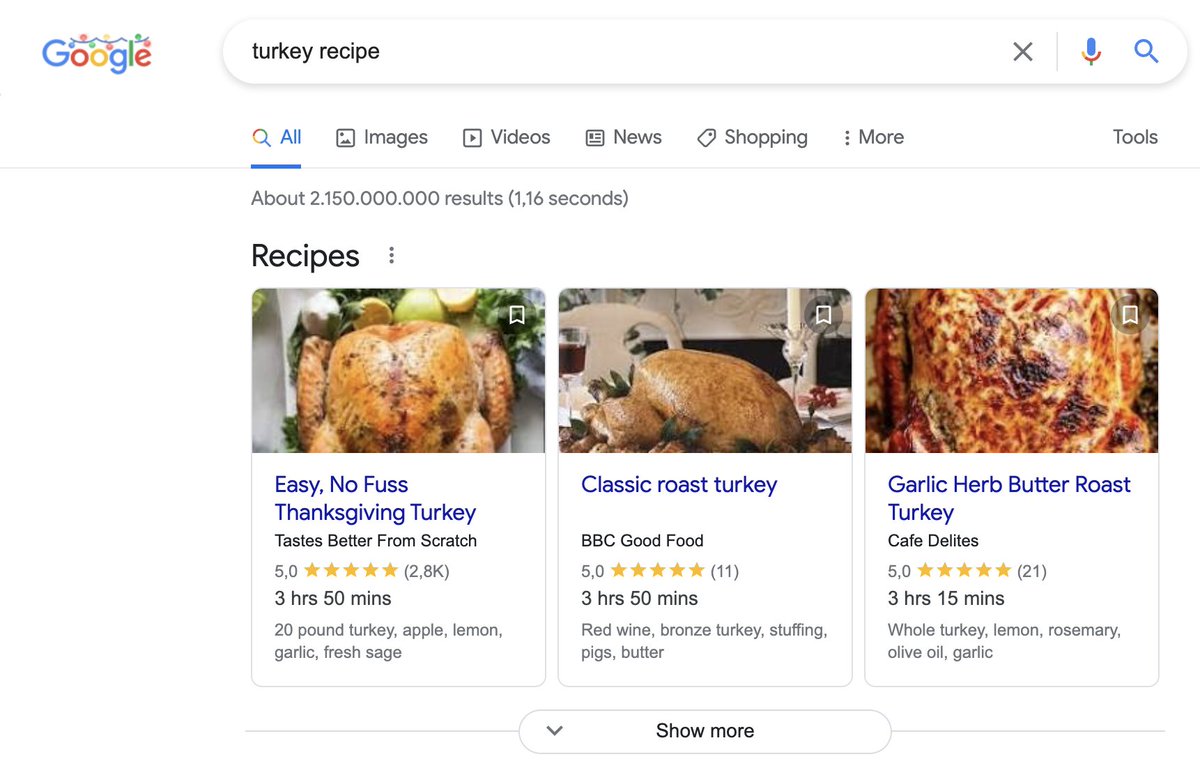SEO is about trust.
Everything stems from trust.
If Google trusts your site, it will promote you to searchers.
If people trust your title(s), they'll click your links.
If people trust the content they are reading, they'll share & give backlinks.
Trust signaling is the goal.
How do you signal trust to Google?
- Fast page loads.
- Great user experience.
- Natural, human generated content.
- Bot readable content.
- Good schema structure.
- Long page dwell times.
Basically, providing great content and a great experience gives you a leg-up.
In search results, Google keeps track of these signals:
1. CTR (Click Through Rate) - When people see your titles, do they click them?
2. Bounce Rate - Do people immediately leave after clicking the link?
3. Page Dwell Time + Scroll Distance - Do people read your content?
Here's what you want:
High CTR
Low Bounce Rate
High Dwell + Scroll
✅ People are attracted to your titles.
✅ They actually make it to your fast-loading site.
✅ They stick around and read the content.
Check these boxes and you'll have a great foundation.
Before you buy a domain name, some considerations:
Luckily, the domain you pick doesn't really matter. anything .com is recommended. People trust .com websites.
Short, readable domains are recommended. Semantically, people will tend to click on sites that seem trustworthy.
When writing content, form your URL as follows:
https:// yourwebsite .com / your-exact-keyword
This URL structure appears cleaner in search results, and having content closer to the root domain gives it more authority.
Tip: don't put your blog on a subdomain.
Now, about your site schema.
Having a filled-out schema is a shortcut for Google to understand what is on your web page.
It could be a blog post, or a landing page, or even a video.
The schema for your site is located in the portion of your HTML.
There's a specific structure that needs to be followed in order for it to be understood by an indexing bot.
Typically, this is managed by your website generator (Wordpress, webflow, etc.).
You can test your schema here:
https://t.co/Lzkb2zVmLq
More website SEO tips:
Make sure your text is readable (font-size, line height, contrast).
Have a mobile first approach (Google likes that).
Add videos + pictures to boost dwell time. Charts are great for this.
If your site loads fast people won't bounce immediately.
Regarding fast load times, you want to make sure your JavaScript tags, and any CDN calls are not blocking your site content.
You also want to minimize your images, and make sure there's no large files.
Test your site performance here:
https://t.co/jbMpA0HKO3
Let's get into Keyword Research
This is arguably the most important part of SEO, but also the part where people get lost in the weeds.
You'll find the best keyword research is to find what competing sites are ranking for in your niche.
I use
https://t.co/PiQjOYbsPb.
I typically recommend targeting medium-difficulty intent-based keywords.
What are intent-based keywords?
The people are looking to take action. Buy something. Solve a problem. Use a tool. Etc. These traffic sources are good for actually selling something online.
I recommend medium-difficulty (say 30/100 on ahrefs) not because you'll rank for that term,
but typically you'll rank for a lot of the long-tail traffic that is generated around that topic.
Eventually, given enough trust signals, you might even rank for that term as well.
Medium-difficulty terms typically allow you to write longer, more comprehensive content, which has been proven to rank better on Google.
To rank for long-tail terms, use terms as H2 headers in subtopics in your content.
I've had massive success with this keyword expansion.
Using a tool like ahrefs, you can see what other sites rank for and can begin gathering a list of keywords that are relevant to your niche.
From that list, ahrefs can generate similar keywords.
Filter the list to be less than 30 difficulty, and more than 500/month traffic.
This gives you keywords that are easy-ish to rank for, but are also typically more valuable traffic.
You can also judge the value of the traffic by looking at the CPC (cost per click of an ad).
To get more ideas on how to generate keywords, look here:
https://t.co/xY6HqxQgMZ
As far as writing content, you want to write in a way that is helpful to the reader.
You don't want to push a product on them immediately. You want to help solve their problem.
Empathize with the reader, and get to the point quickly and accurately. Talk to them personally.
Some other tips for writing helpful content:
- Include navigation links for a long piece.
- Highlight/bold important information.
- Make a TL/DR at the top.
- Get straight into the content, without the fluff.
- Include charts and infographics (shareable stuff).
As far as the content you should be writing, here's one of the most important things to know about SEO:
*Write content that people who link to content will link to.*
So many people only think about customers, but to build backlinks your content needs to be incredible.
And not only does it need to be incredible, it needs to be content other people who publish content will backlink to it as a reference in their own content.
Sometimes you can write things specifically for customers (and not to build links), but backlinks signal trust to Google.
I personally have never gone on a hunt for backlinks.
I approach it like this so backlinks come naturally. Less labor for you.
The more links your site gets naturally, the higher your collective rankings will be for all of your content.
On Titles:
Titles are the most important piece for getting a high CTR.
You don't want to click-bait people, but you also want to make it inticing.
To be short - Numbers, and special characters are more attractive.
"Basic SEO Tips"
"39 Essential SEO Tips [In 2020]"
That's it for this thread. If you want to see more threads like this - retweet the first tweet.
I'll dive deeper into the topics mentioned.
You might see a basic SEO course from me in the future.
Stay tuned!
Oh, and something that most people forget to mention (even me)
You need to index your site to get Google to put it in search results.
Same for Bing, and other search engines.
You can submit your sitemap to Google here:
https://t.co/v6iqVOUS4R






















